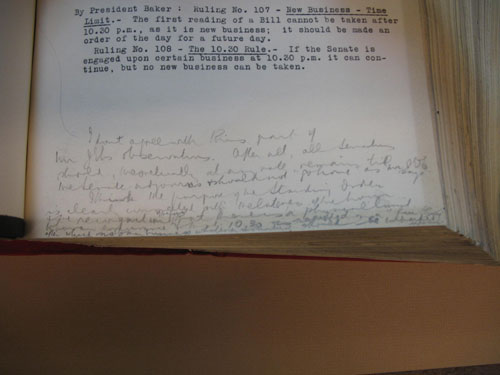64 New business
No new business shall be commenced after the question for the adjournment of the Senate has been first put on any sitting day.
Amendment history
Adopted: 19 August 1903 as SO 64
Amended: 28 April 1981, J.213–14 (to change timing from a specified time to a point in the routine of business)
1989 revision: Old SO 68 renumbered as SO 64 and rephrased in more specific language
Commentary

Edwards' notes on SO 64 with later commentary ny J.R. Odgers
Standing order 64 has little application under the current hours of meeting and routine of business which do not include the putting of a question “That the Senate do now adjourn”. The adjournment cannot be negatived under the normal routine of business and occurs at or by a fixed time on most nights without any question being put (see SOs 53 to 55 and 57).
As originally formulated, the standing order prevented new business from being commenced after 10.30 pm. The 1938 MS notes that there had been some variations in practice in the interpretation of “new business”. Edwards observed that the corresponding standing order in the House referred to “opposed business” and that the Senate had on occasion allowed new, unopposed business to be dealt with after 10.30 pm. He considered this practice to be against the purpose of the standing order because it allowed business to be done that senators who had left for the day might have opposed had they known about it. It was thus a potential infringement of the rights of senators. For the most part, however, new business had been interpreted as any new business in accordance with early rulings of President Baker.[1]
In 1980, the Standing Orders Committee considered that some updating was required to take account of contemporary practice. On broadcast days, the adjournment of the Senate was not moved until 11 pm and sessional orders invariably included different adjournment times on different days. According to the committee, it had been the practice to regard this standing order as having effect at 11 pm on broadcast days by common understanding. The committee recommended that the specific time be replaced with the phrase “after the adjournment of the Senate has first been proposed on any sitting day”.[2] The Senate adopted the recommendation on 28 April 1981 and the standing order was amended accordingly. The 1989 revision replaced this phrase with the more accurate “after the question for the adjournment of the Senate has been first put on any sitting day”.
The 1938 MS had noted the frequency with which this standing order had been suspended towards the end of sitting periods to enable business to continue into the night. The suspension could be achieved with a simple majority if notice were given but required an absolute majority if moved without notice.[3] In later times, it was common for Leaders of the Government in the Senate to have contingent notices on the Notice Paper for the suspension of SO 64, which could be moved contingent on the Senate concluding any item of business before the question for the adjournment of the Senate was first put on any day. In such cases, the motion could be passed with the support of a simple majority.
Such notices have been unnecessary since the adoption of the new routine of business in 1994. When additional business is required to be dealt with, the government moves a motion, either on notice or by leave, to vary the hours of meeting and routine of business in respect of particular days. Such motions may sometimes specify the business that may be done during the varied hours of meeting.